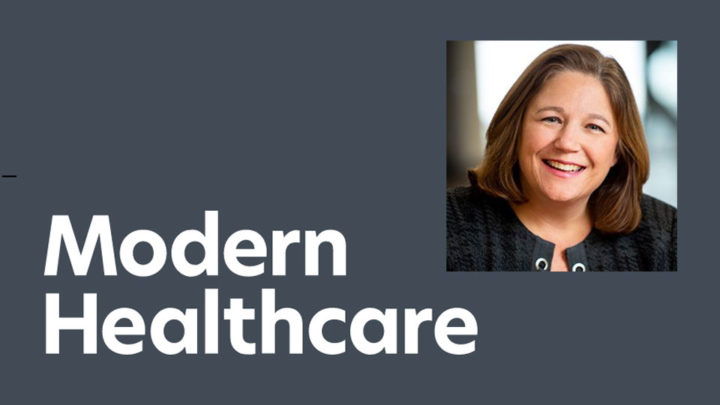PBGH Chair Honored as Top Health Care Innovator

Lisa Woods, Pacific Business Group on Health (PBGH) board chair, was honored August 24 by Modern Healthcare Magazine as one of the Top 25 Innovators for 2020.
Woods serves as Senior Director of U.S. Strategy and Benefits Design for Walmart Inc., the country’s largest employer. Her responsibilities include ensuring that 1.5 million Walmart associates and their dependents have access to comprehensive, affordable health benefits.
“We’re thrilled but not surprised that Lisa’s long-time efforts have been recognized,” said Elizabeth Mitchell, president and chief executive officer of PBGH. “Her track record of developing creative, comprehensive and effective solutions to extremely difficult problems, coupled with her genuine commitment to the health and welfare of Walmart associates, make her uniquely qualified for this honor.”
“All of us at the Pacific Business Group on Health feel fortunate to have the benefit of her experience, insight and judgment as we work to help America’s largest employers and health care purchasers reduce soaring costs without compromising quality.”|
Key innovations
Woods began her career with Walmart more than 30 years ago as a medical claims processer. Her duties steadily evolved and expanded to include claims auditor, architect of the retail giant’s claims processing system, and manager of the company’s research and development, fraud and abuse and customer service teams. In her current role, Woods leads the Walmart’s strategic benefit design efforts. Among her most significant innovations:
- Centers of Excellence: Walmart created a Centers of Excellence program that pays all expenses for employees and their families to have surgery at approved medical centers for transplant, heart or spinal surgery, or knee and hip replacement. The program’s results have been impressive: Walmart’s per- patient cost for joint replacements was more than $4,000 less than at non-COE facilities; one-fifth of patients avoided unnecessary procedures; all patients treated at COEs had three times fewer hospital readmissions and collectively were 70% less likely to be readmitted to the hospital. The program serves as a model which PBGH is working to replicate for the benefit of other employers nationwide.
- Increasing Access to Affordable Care: At the start of 2020, Walmart kicked off four health care benefit pilot programs aimed at expanding access to more affordable and effective health care services and lowering costs for employees and the company. The four pilots include a referral service using data analytics to steer patients to the highest-performing physicians, a free concierge service, $4 telemedicine visits and technology that enables patients to easily locate doctors with a history of providing high-quality care.
- Expanding Direct Contracting: Walmart has launched insurance products through direct contracting relationships with the nation’s top hospitals and health systems. By focusing on quality and making sure patients are directed to the most appropriate care and provider within a network, the program has saved money for the company and its employees.
Modern Healthcare noted that this year’s Top 25 Innovators championed scalable solutions being used to reshape health care in ways both big and small. While many of this year’s honorees pushed solutions that directly address the coronavirus epidemic, the magazine said, their innovations and approaches to problem-solving will be beneficial long after the crisis is over.
The full list of innovators and profiles of the winners are featured on Modern Healthcare’s site.



